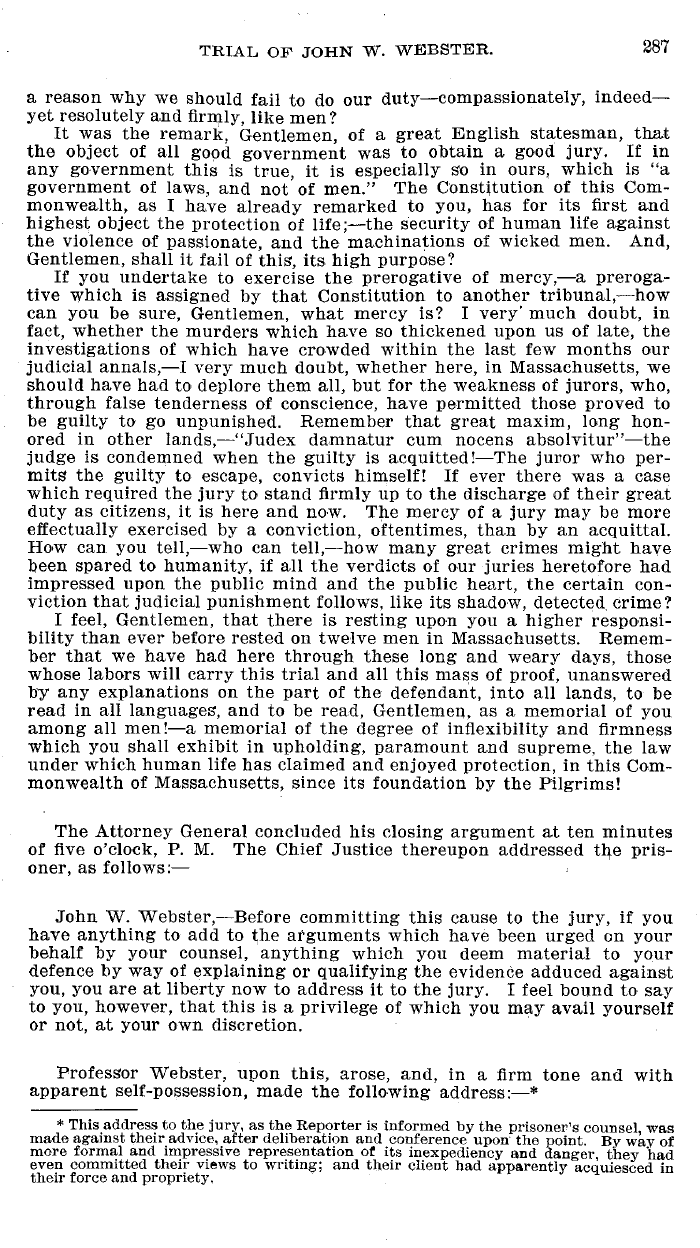|
TRIAL OF JOHN W. WEBSTER. 287
a reason why we should fail to do our duty-compassionately, indeed-
yet resolutely and firmly, like men?
It was the remark, Gentlemen, of a great English statesman, that
the object of all good government was to obtain a good jury. If in
any government this is true, it is especially so in ours, which is "a
government of laws, and not of men." The Constitution of this Com-
monwealth, as I have already remarked to you, has for its first and
highest object the protection of life; the security of human life against
the violence of passionate, and the machinations of wicked men. And,
Gentlemen, shall it fail of this, its high purpose?
If you undertake to exercise the prerogative of mercy,-a preroga-
tive which is assigned by that Constitution to another tribunal,-how
can you be sure, Gentlemen, what mercy is? I very' much doubt, in
fact, whether the murders which have so thickened upon us of late, the
investigations of which have crowded within the last few months our
judicial annals, -I very much doubt, whether here, in Massachusetts, we
should have had to deplore them all, but for the weakness of jurors, who,
through false tenderness of conscience, have permitted those proved to
be guilty to go unpunished. Remember that great maxim, long hon-
ored in other lands,-"Judex da.mnatur cum nocens absolvitur"-the
judge is condemned when the guilty is acquitted!-The juror who per-
mits the guilty to escape, convicts himself! If ever there was a case
which required the jury to stand firmly up to the discharge of their great
duty as citizens, it is here and now. The mercy of a jury may be more
effectually exercised by a conviction, oftentimes, than by an acquittal.
How can. you tell, who can tell,-how many great crimes might have
been spared to humanity, if all the verdicts of our juries heretofore had
impressed upon the public mind and the public heart, the certain con-
viction that judicial punishment follows, like its shadow, detected, crime?
I feel, Gentlemen, that there is resting upon you a higher responsi-
bility than ever before rested on twelve men in Massachusetts. Remem-
ber that we have had here through these long and weary days, those
whose labors will carry this trial and all this mass of proof, unanswered
by any explanations on the part of the defendant, into all lands, to be
read in all languages, and to be read, Gentlemen, as a memorial of you
among all men!-a memorial of the degree of inflexibility and firmness
which you shall exhibit in upholding, paramount and supreme, the law
under which human life has claimed and enjoyed protection, in this Com-
monwealth of Massachusetts, since its foundation by the Pilgrims!
The Attorney General concluded his closing argument at ten minutes
of five o'clock, P. M. The Chief Justice thereupon addressed the pris-
oner, as follows:
John W. Webster,-Before committing this cause to the jury, if you
have anything to add to the arguments which have been urged on your
behalf by your counsel, anything which you deem material to your
defence by way of explaining or qualifying the evidence adduced against
you, you are at liberty now to address it to the jury. I feel bound to say
to you, however, that this is a privilege of which you may avail yourself
or not, at your own discretion.
Professor Webster, upon this, arose, and, in a firm tone and with
apparent self-possession, made the following address: -*
This address to the jury, as the Reporter is informed by the prisoner's
counsel, was
made against their advice., afer deliberation and conference upon the
point. By way of
more formal and impressive representation of its inexpediency and danger,
they had
even committed their views to writing; and their client had apparently
acquiesced in
their force and propriety,
|

